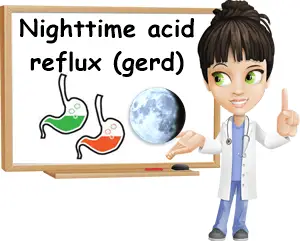Acid reflux at night while sleeping is a common occurrence. Whether it’s because of lying down while sleeping which encourages regurgitation of stomach juices, or because of going to sleep with a full stomach, a lot of people experience acid reflux at night only or acid reflux that is worse at night.
Nighttime acid reflux often causes choking and coughing as a result of the accidental aspiration of stomach juices into the lungs during sleep. There are a number of reasons for acid reflux at night, including going to bed right after eating, having a heavy dinner or an untreated stomach condition like GERD or gastritis or a hiatal hernia. But whatever the cause, it is important to know how to stop acid reflux at night to avoid the long-term health risks associated with it.
What causes acid reflux at night?
The same thing that causes acid reflux in general, in both men and women: a poor diet. That is, a diet rich in processed foods, heavy fried foods, spicy or heavily seasoned foods, acidic foods, chocolate, high-fiber foods, alcohol and coffee. Eating poorly causes an excess production of gastric juices needed to carry out the digestion process and that leads to acid reflux during the day and at night.

What else causes acid reflux at night? For example, the reflux is more likely if you eat dinner late at night and lie down on the couch or in bed right after. A heavy dinner, rich in foods that are bad to eat for acid reflux, such as heavy meats, fried foods etc., will lead to a long digestion time and increase the likelihood of nighttime acid reflux.
In addition to food triggers, pregnancy, excess weight, chronic conditions requiring prolonged treatment with various medication, gastritis, a hiatal hernia or other physical abnormalities also contribute to acid reflux, both during the day and at night.
Night time acid reflux symptoms
- Heartburn, a strong burning sensation in the chest, a sign stomach juices have escaped from the stomach and risen into the esophagus.
- Regurgitation of small amounts of stomach acid into the mouth.
- Bad taste in the mouth (acidic, metallic, sour or reminiscent of the foods eaten at dinner).
- Bad breath: a foul, rotten or sour smell to one’s breath, present both at night and in the morning.
- Sore throat: the throat feels swollen, scratchy, dry, hot or burning.
- Globus sensation the next day: the persistent feeling of having something stuck in the throat, whether it feels like a pill, mucus, a lump or something else.
- Severe indigestion with symptoms like: dull or burning pain, more commonly in the middle of the abdomen, around the belly button, or in the right side, bloating, severe burping or gas, cramps, nausea.
- Aspiration of stomach juices into the lungs which causes choking and coughing. The person usually wakes up from their sleep coughing violently.
- Interrupted sleep: waking up from sleep because of the heartburn pain or the regurgitation of stomach juices into the mouth.
- Throwing up, either just stomach acid or stomach acid and partially digested food. A lot of people with acid reflux at night vomit first thing in the morning when they wake up. The vomit is often liquid and green and in little amount. Also see these 16 telling acid reflux symptoms.

How to stop acid reflux at night
Treatment consists of eating healthier and also leading a healthier lifestyle. There is no other way around treating the condition, so don’t expect to be eating the same foods you did before if you are looking to stop the acid reflux for good.
Medication such as antacids or proton pump inhibitors can help you transition to a healthier diet, but unless you plan on spending your lifetime treating something that can be solved with healthier eating, you have to change your diet. In rare cases, conditions such as a hiatal hernia can predispose to GERD, or gastroesophageal reflux disease, and may require surgery. But even in these cases, dietary changes are of paramount importance.
Read on for the best tips and tricks on how to both prevent and treat acid reflux at night:
- Eat healthier. See here what foods to eat and to avoid for acid reflux.
- Have dinner earlier, at 6 or 7 p.m. Eat at least 3 hours before going to bed.
- Have a light dinner. For example, white meat like chicken or white fish like cod and vegetables such as spinach, potatoes, sweet potatoes, parsnip, carrots, mushrooms. Boil, steam or grill. Season with only salt and a little fresh olive oil.
- Eat small meals, especially at dinner time, but don’t starve yourself. You can have a snack or two between lunch and dinner so you don’t feel too hungry at dinner time and overeat.
- Cook your own meals to avoid eating too fatty, too heavy, too spicy, acidic or overly seasoned food.
- Don’t sit on the couch and don’t lie down in bed right away after eating. Take a leisurely walk after dinner – gravitation helps digestion.
- Avoid snacking after dinner and right before bed. You can drink a calming herbal tea instead.
- You can opt for natural remedies to help stave off acidity, such as digestive teas, marshmallow root tea or supplements or Aloe vera on an empty stomach in the morning (look out for allergies). See the benefits of marshmallow root.
- Avoid exercising after dinner. And after any meal of the day.
- Don’t smoke after dinner. Don’t smoke at all. But avoiding it at night in particular is good for preventing nighttime acid reflux.
- Sleep with your head and shoulders elevated. Use one or two extra pillows.
- Sleep on your left side. Sleeping on your right side is more likely to cause acid reflux at night.
- Wear loose-fitting clothes. Tight clothes, especially over the abdominal area, constrict the stomach.
- Manage the occasional acid reflux attack at night by rising to your feet, drinking some water and taking antacids.
- Long-term goal: reach a healthy weight and lead a healthier lifestyle.
Conclusion
There are a few reasons why acid reflux is worse at night, or more likely to occur at night. A lot of people eat trigger foods at night to indulge themselves after a long, hard day. A lot of people have a large dinner because they may not have had time to eat much during the day so they catch up at dinner time. Or they eat close to bed time because of a busy schedule. Or they don’t have the time to cook a healthy, home-made meal because of their busy schedule. While understandable, if your acid reflux is more than just occasional and wakes you up at night from your sleep with severe chest pain or causes you to choke and cough or vomit, then you need to take action and make the necessary changes to turn things around for the better.
